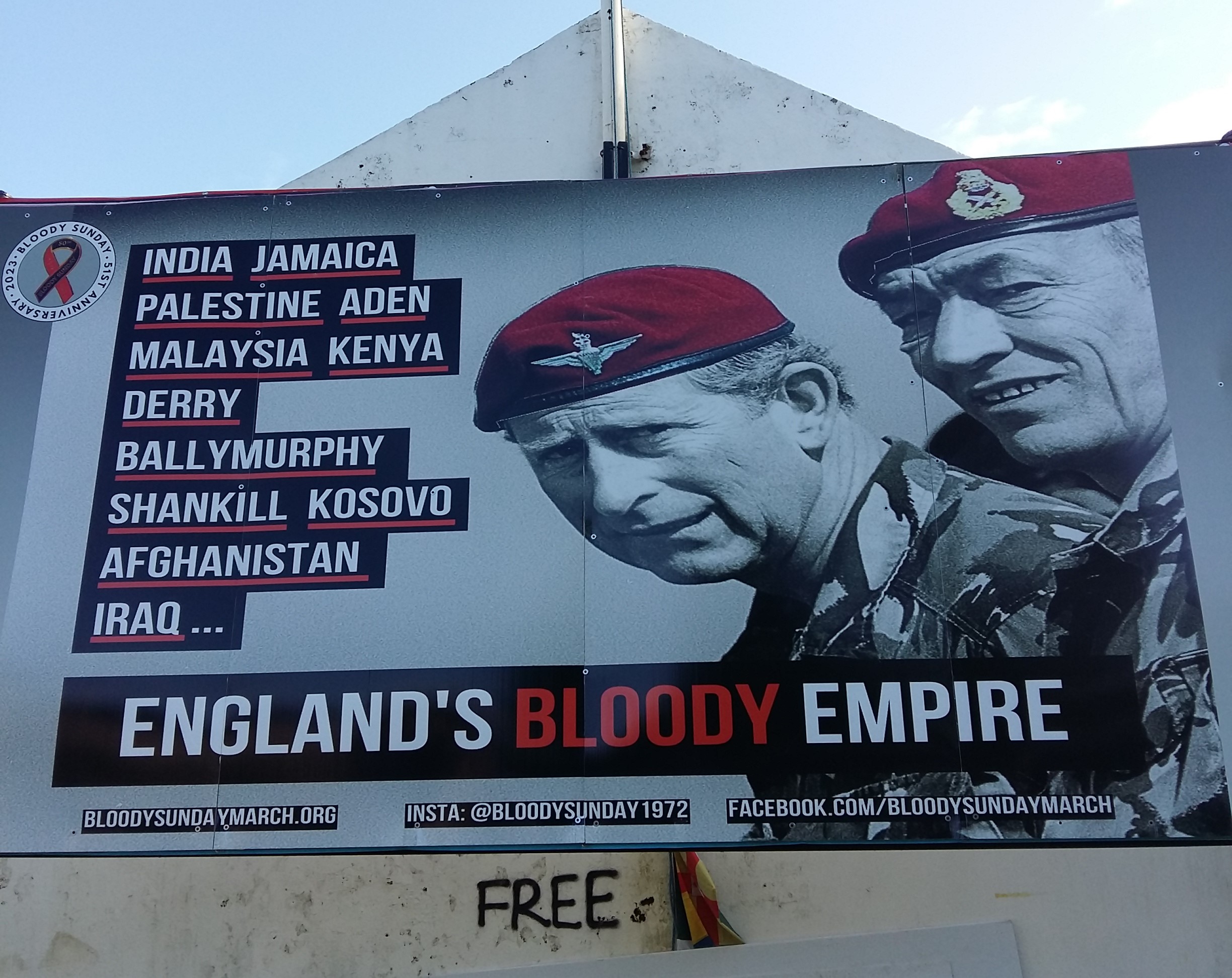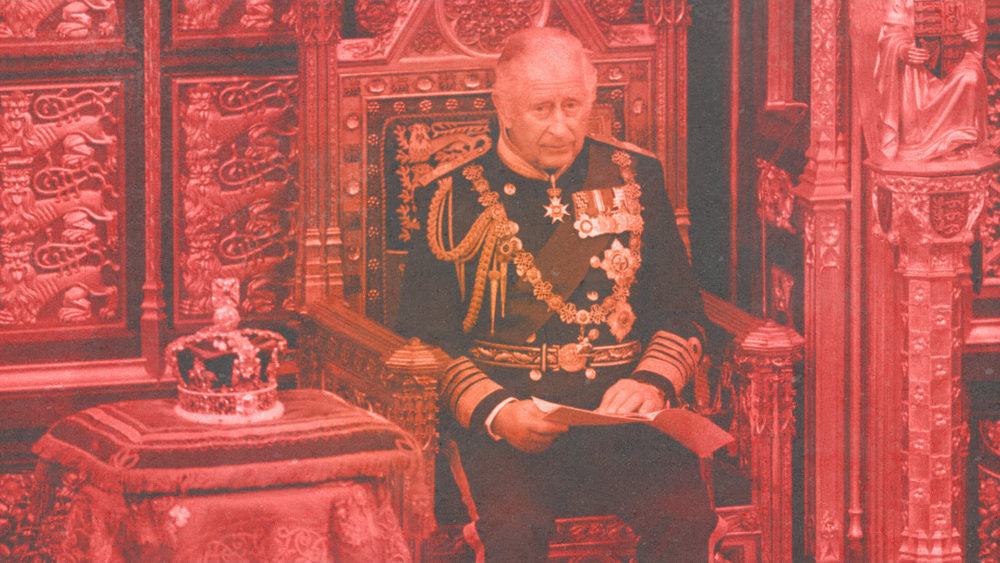Last weekend, people were subjected to the spectacle of pomp and ceremony of a Coronation in Britain. The ‘Prince of Wales’ became the latest monarch as the third Charles to hold this title in the thousand year reign of monarchy.
He is now the Head of State of a ‘Constitutional Monarchy’. This arrangement, ushered in at the time of the two other preceding Kings named Charles in the 17th century, can be described as a pact agreed between the ‘men of property’ – the landowning aristocrats and the emerging money controlling ‘mercantile class’. In effect it was a brake on the potential for advancing democracy for the ‘women and men of no property’ proposed by the Levellers.
The British Monarchy is both representative of and intertwined with a worldwide exploitative system controlled and run primarily for the enrichment of an oligarchic minority. This system is based on and fuels massive and increasing inequalities. An exact estimation of how much wealth that King Charles extracts and is in control of is not easy to ascertain because of the secrecy and lack of transparency that shrouds the financial transactions and economic ties of the ‘Royal Family’.
The Royal Family’s net worth
Some indication can be gleaned about the growing amount the ‘royals’ receive from the ‘public purse’ in the form of the ‘sovereign grant’. In its first year of operation – 2012-13 – the monarchy budget was £31 million. In 2022, it was £87.3 million. There are suggestions that it might transpire that Charles could potentially be in receipt of £330 million per year. The Guardian newspaper recently estimated that the newly crowned King, who is also legally free from the obligation to pay inheritance tax, could be in control of wealth worth £1.8 billion.
Although the Monarchy tries to distance itself in the public eye from exploitative business dealings, it is clear to see that the financial and economic interests of the King are also very much tied in with the affairs and transactions of the oligarchic monopolies. For instance, the Crown Estate as ‘landowners’ could gain £120 million from one gold mining operation, which could yield £3 billion over 25 years if it goes ahead in Ireland.
When local community activists sent a letter to Charles, when he was Prince of Wales, that sought to hold him to account for his responsibilities as a self-declared ‘environmentalist’, his response was that he ‘cannot get involved’.
The Monarchy’s military
The British King and the Monarchy as an institution are also associated with the military apparatus of the UK State. This is a military that has been involved in aggressive interventions resulting in many atrocities to peoples in various parts of the world, such as in Palestine and Ireland, and more recently in Afghanistan and Iraq.
Not only do the ‘Royals’ have a public relations function to deceptively portray the British armed forces as a benign force helping to bring peace and protect democracy globally, they can also be integrated into the armed forces in order to enhance this role. Charles is Colonel-in-Chief of the British army’s Parachute Regiment who infamously massacred civil rights activists in Derry in 1972 who were attending a demonstration against internment without trial.
The unelected Monarchy in Britain is being viewed by more and more people to be inherently anti-democratic. Although it is perceived as having no formal powers of authority and decision making it has been described as having so-called ‘soft power’ and influence over the people in perpetuating the myth that ‘rulers should rule while the ruled should meekly accept being ruled by the rulers’.

Freedom of speech
The Coronation of King Charles has produced another illustration of the absurdity of this archaic and undemocratic notion. A plan to ask the public to pledge an oath of allegiance to Charles during the Coronation ceremony was unveiled. Activists, who are campaigning for a democratic Republic to replace the UK ‘Constitutional Monarchy’, described this idea as “offensive, tone deaf and a gesture that holds the people in contempt” and that “In a democracy it is the head of state who should be swearing allegiance to the people, not the other way around. This kind of nonsense should have died with Elizabeth I, not outlived Elizabeth II“. The same campaigners were then arrested on the day of the Coronation before they could hold their peaceful protest they had planned to coincide with the event.
Despite the draconian actions by the State to suppress challenges by activists who want to see genuine democracy not offered by ‘constitutional monarchy’, the people found ways to express their views and protest that a king or queen should not be the Head of State in a Democracy. At a football match, Liverpool fans held up protest posters stating ‘Not My King’ and booed the ‘God Save The King’ anthem being played at Premier League games on the day of the Coronation. When asked to comment on these actions, Liverpool manager Jurgen Klopp responded by saying “We have freedom of speech. That means a free opinion as well.”
Remember James Connolly
May 12 is the anniversary of the execution by ‘His Majesty’s Government’ in 1916 of James Connolly, the trade union leader and activist for democracy and social change. Connolly was an outspoken critic of monarchical and oligarchical rule in any part of the world, especially in Ireland and Britain where he was politically active for most of his short life.
Today, Connolly is still held in high esteem for his championing of the cause of the working people and ably connecting this with the struggle to bring about democracy for the people – characterised in his proposal that ‘the cause of Ireland is the cause of Labour, the cause of Labour Is the cause of Ireland’. This respect for him has been publicly shown in recent times with people voting him as the second most popular figure in Irish history, and by politicians such as Jeremy Corbyn who referenced Connolly’s contribution and legacy in a speech at a MeRA25 conference in Athens.
Connolly clearly saw that the ‘rule of kings’ in modern times was nothing more than one of the cosmetic facilitators for the real rule exercised by the wealth expropriating and money monopolising oligarchs. For him, the only chance of achieving and developing a democracy where the many collectively ran the society and the economy in the interests of all and not the few, involved a complete transformation to remove the power, domination and means of exploitation by oligarchs. This was summed up in a quotae from him:
“If you remove the English Army tomorrow and hoist the green flag over Dublin Castle, unless you set about the organisation of the Socialist Republic your efforts will be in vain. England will still rule you. She would rule you through her capitalists, through her landlords, through her financiers, through the whole array of commercial and individualist institutions she has planted in this country and watered with the tears of our mothers and the blood of our martyrs.”
In DiEM25’s ‘A Manifesto For Democratising Europe’ we echo this thinking for the the similar and complex situation of today where Europe and the rest of the world is ruled by oligarchs:
“They pretend to care about democracy, but behind the scenes they use all their power and influence to make sure you have no say in how they do things. The nightmare of all oligarchs is real democracy. There is only one way to break with this: a democratic revolution! We can defeat them, and we will not stop until our vision of a deep democracy spreads into the corporate system, our economy, our local councils, our parliaments and all our institutions.”
Do you want to be informed of DiEM25's actions? Sign up here















